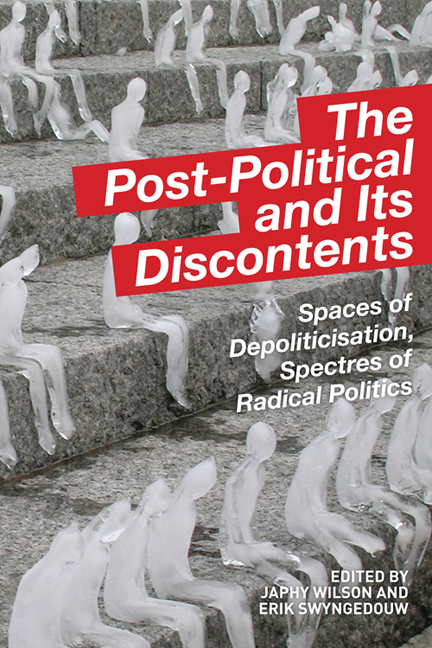Book contents
- Frontmatter
- Contents
- List of Contributors
- Seeds of Dystopia: Post-Politics and the Return of the Political
- Part I Spaces of Depoliticisation
- Part II Spectres of Radical Politics
- 8 Insurgent Architects, Radical Cities and the Promise of the Political
- 9 The Limits of Post-Politics: Rethinking Radical Social Enterprise
- 10 Neither Cosmopolitanism nor Multipolarity: The Political Beyond Global Governmentality
- 11 Against a Speculative Leftism
- 12 Spatialising Politics: Antagonistic Imaginaries of Indignant Squares
- 13 After Post-Politics: Occupation and the Return of Communism
- 14 The Enigma of Revolt: Militant Politics in a ‘Post- Political’ Age
- There Is No Alternative
- Index
8 - Insurgent Architects, Radical Cities and the Promise of the Political
from Part II - Spectres of Radical Politics
Published online by Cambridge University Press: 05 August 2016
- Frontmatter
- Contents
- List of Contributors
- Seeds of Dystopia: Post-Politics and the Return of the Political
- Part I Spaces of Depoliticisation
- Part II Spectres of Radical Politics
- 8 Insurgent Architects, Radical Cities and the Promise of the Political
- 9 The Limits of Post-Politics: Rethinking Radical Social Enterprise
- 10 Neither Cosmopolitanism nor Multipolarity: The Political Beyond Global Governmentality
- 11 Against a Speculative Leftism
- 12 Spatialising Politics: Antagonistic Imaginaries of Indignant Squares
- 13 After Post-Politics: Occupation and the Return of Communism
- 14 The Enigma of Revolt: Militant Politics in a ‘Post- Political’ Age
- There Is No Alternative
- Index
Summary
It's useless to wait – for a breakthrough, for the revolution, the nuclear apocalypse or a social movement. To go on waiting is madness. The catastrophe is not coming, it is here. We are already situated within the collapse of a civilization. It is within this reality that we must choose sides. (The Invisible Committee 2009: 138)
Insurgent architects: staging equality
The Taksim Square revolt in Istanbul and the Brazilian urban insurgencies are still in full swing at the time of writing, with uncertain and largely unpredictable outcomes. Romanian activists mobilise Occupy-type tactics sparked off by resistance to accumulation by dispossession and threatened socio-environmental destruction by Canadian company Gabriel Resources around planned gold mining in Rosia Montana. These urban rebellions are the latest in a long sequence of political insurgencies that unexpectedly erupted after Mohamed Bouazizi's self-immolation on 17 December 2010 ignited the Tunisian revolution. During the magical year 2011, a seemingly never-ending proliferation of urban rebellions sparked off by a variety of conditions and unfolding against the backdrop of very different historical and geographical contexts profoundly disturbed the apparently cosy neoliberal status quo and disquieted various economic and political elites. There is indeed an uncanny choreographic affinity between the eruptions of discontent in cities as diverse as Istanbul, Cairo, Tunis, Athens, Madrid, Lyon, Lisbon, Rome, New York, Tel Aviv, Chicago, London, Berlin, Thessaloniki, Santiago, Stockholm, Barcelona, Montreal, Oakland, Sao Paulo, Bucharest, and Paris, among many others. The end of history proved to be remarkably short-lived as incipient political movements staged – albeit in often inchoate, contradictory, and confusing manners – a profound discontent with the state of the situation and choreographed new urban modes of being-in-common.
A wave of deeply political protest is rolling through the world's cities, whereby those who do not count demand a new constituent process for producing space politically. The heterogeneous gatherers are outraged by and expose the variegated ‘wrongs’ and spiralling inequalities of autocratic neoliberalisation and actually-existing instituted democratic governance. The celebrated era of urban social movements as the horizon of progressive urban struggles (Castells 1993) seems to be over. A much more politicised if not radical mobilisation, animated by insurgent urban architects, is increasingly choreographing the contemporary theatre of urban politicised struggle and conflict (Swyngedouw 2013).
- Type
- Chapter
- Information
- The Post-Political and Its DiscontentsSpaces of Depoliticisation, Spectres of Radical Politics, pp. 169 - 188Publisher: Edinburgh University PressPrint publication year: 2014

